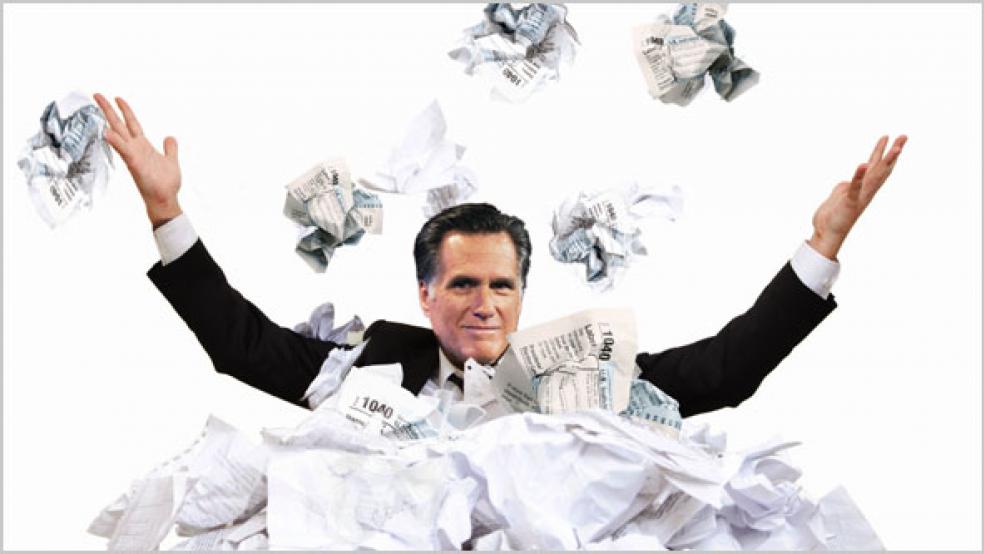For a man who has had his share of bad moments in presidential debates this cycle, the topic of Mitt Romney’s tax returns gave Rick Perry a rare winning exchange. The Texas governor took the opportunity in Monday’s debate to demand that Romney release his IRS records.
Perry and the other Republican candidates have already released theirs -- all except Newt Gingrich, who will release his returns later this week. “And Mitt,” Perry said in his debate answer on the controversy over Bain Capital, “we need for you to release your income tax so the people of this country can see how you made your money. And I think that’s a fair thing.”
A fair thing? Perhaps ... but only in relation to the voluntary disclosures of the other candidates. Otherwise, it feels like an invasion of privacy for no good purpose but the politics of envy.
Don’t get me wrong. Financial disclosure is an important part of ensuring that elected officials don’t abuse their power to favor their own pocketbooks over the interests of taxpayers. Members of Congress have to disclose their financial holdings for this purpose, along with estimates of personal wealth, all of which are made public. Presidents do the same, although it has been the practice of most White House occupants to move their assets into blind trusts instead, allowing others to manage their wealth until after they leave the presidency.
Barack Obama is a curious exception to this tradition. Obama eschewed the blind trust and opted to manage his own affairs, rationalizing that because he has avoided investing in the stock market, his political decisions will not be construed as conflicts of interest or abuses of power. So far, he has been proven correct. The White House will respond to queries about Obama’s wealth with a financial disclosure report, though, and Obama has released his income-tax returns each year since he ran for President in the first place – although Obama waited until April 2008 to do so.
Tax returns offer no further protection against public corruption, but do offer a voyeuristic peek into the private lives of candidates.
This tradition of presidential 1040 disclosures only goes back to the post-Watergate era, and it is not universal. According to Politifact, seven out of 34 candidates between 1976 and now refused to disclose their tax returns, the latest being Mike Huckabee and Rudy Giuliani in 2008. None of these men won the nomination, but it could hardly be said that the failure to release their returns was a major factor in their losses. Income tax returns don’t tell much about financial assets and potential conflicts of interest that can’t be gleaned from their FEC-required disclosures, and so the lack of that data hardly matters.
Tax returns offer no further protection against public corruption, but do offer a voyeuristic peek into the private lives of candidates. What tax breaks do they seek? How much do they contribute to charity? What is their precise income level and their effective tax rate? No one really believes that they will find a crime that the IRS somehow managed to miss, like some sort of financial Sherlock Holmes, and almost everyone who reads them wouldn’t have the expertise to catch one anyway.
The prurient interest in the tax returns of both Romney and Gingrich seems a little out of character for conservatives.
So why do we have this tradition at all? It appears to have been a reaction to Watergate, as implied by Politifact, and a form of playing “doctor” among political opponents, as in you-show-me-yours-and-I’ll-show-you-mine. It is a surprising tradition in a country that values personal privacy, and especially in a political party that expresses so much resentment over the IRS prying into the very same areas of most other taxpayers. Many conservatives want to get the federal government out of the business of income tracking altogether by moving to a consumption tax instead. Culturally, many of us still consider a question even from friends or family to disclose our income as at least gauche and perhaps positively rude.
That is why the prurient interest in the tax returns of both Romney and Gingrich seems a little out of character for conservatives – like the attacks on Bain Capital for conducting normal and successful private-equity strategies. It sounds more like the kind of demand one would expect from Obama, and indeed the Obama campaign has already attacked Romney for not disclosing his tax returns. This led to an exchange in the White House briefing room between veteran correspondent Ed Henry and Press Secretary Jay Carney, when the Fox reporter asked the White House to disclose Obama’s college transcripts. (Carney referred Henry to the campaign for an answer to that question.)
Romney hasn’t helped himself with his response in this case, either. Instead of arguing why his privacy – and those of other candidates – should be respected, he said that he would get around to releasing them around the next tax cycle in April. Having given away the argument already, there isn’t much point in continuing to avoid the release, and Romney will likely accelerate that decision to quash this line of criticism. It’s too bad, because we need to have a conversation about the boundaries of transparency and privacy, and the difference between disclosure and voyeurism in politics.




